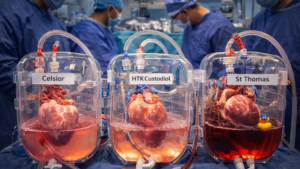Gastrointestinal complications (GICs) following cardiac surgery are rare but clinically significant, often leading to longer recovery times, increased costs, and higher postoperative mortality. A recent retrospective cohort study published in Perioperative Medicine sheds light on how prolonged cardiopulmonary bypass (CPB) times affect the incidence and outcomes of GICs in patients undergoing cardiac surgery.
This single-center study evaluated 1,444 adult patients who underwent cardiac surgery using CPB between January 2018 and December 2023 at the First Hospital of Lanzhou University. Patients were stratified based on the duration of CPB into two groups: those with CPB durations of 120 minutes or more (prolonged CPB group) and those with durations under 120 minutes (normal CPB group). Propensity score matching (PSM) was applied to control for baseline differences between the two groups, providing a robust comparison of outcomes.
Increased GICs in Prolonged CPB Patients
The study found that the incidence of GICs in the overall patient population was 8.59%. However, patients in the prolonged CPB group had a significantly higher incidence of GICs compared to the normal group (14.58% vs. 3.17%, p < 0.001). After PSM, this association persisted (8.09% vs. 4.31%, p = 0.014), confirming that prolonged CPB independently contributes to a higher risk of GICs.
GICs assessed included gastrointestinal bleeding, hepatopancreatobiliary dysfunction, ileus, GI infections, and mesenteric ischemia. Prolonged CPB was particularly associated with GI bleeding and ileus. Although mesenteric ischemia was rare, its severity calls for heightened vigilance in patients with extended CPB duration.
Risk Factors Beyond CPB Duration
Multivariate logistic regression analyses revealed several independent risk factors for developing GICs: prolonged CPB (OR 1.86), hypertension (OR 1.86), reduced LVEF (OR 0.92), and undergoing aortic surgery (OR 2.72). These findings underline the multifactorial nature of GICs in cardiac surgery patients.
Furthermore, preoperative use of vasoactive agents, male sex, and higher New York Heart Association (NYHA) class (III or IV) also significantly increased the odds of postoperative gastrointestinal events. The data reinforce that patient comorbidities and procedural complexity must be factored into perioperative planning.
Systemic Impact of Prolonged CPB
Prolonged CPB was associated with several negative outcomes beyond GICs. These included increased rates of low cardiac output syndrome (LCOS), acute kidney injury (AKI), and hospital-acquired infections (HAI). Patients in the prolonged CPB group also faced longer ICU stays, prolonged ventilator time (VAT), and higher in-hospital costs. These systemic effects are likely mediated by ischemia–reperfusion injury (IRI), inflammation, and microcirculatory disturbances, all of which are exacerbated by extended CPB duration.
Clinical Implications and Future Directions
The findings of this study highlight a critical need for minimizing CPB duration whenever clinically feasible. Surgeons and perfusionists should adopt optimized strategies to reduce bypass time, such as employing off-pump techniques where suitable or improving intraoperative efficiency. For high-risk patients—those with hypertension, poor cardiac function (low LVEF), or scheduled for aortic procedures—enhanced gastrointestinal monitoring and prophylactic interventions may help prevent severe complications.
This study’s design, including its use of PSM and large sample size, strengthens its findings. However, as a retrospective analysis, it cannot establish causality. The focus on 30-day postoperative outcomes also limits insight into long-term GIC risk. Future research should aim to explore mechanisms underlying GICs post-CPB and evaluate potential protective strategies through prospective, multicenter studies.
Conclusion
Prolonged CPB duration is a clear and independent risk factor for gastrointestinal complications in patients undergoing cardiac surgery. Identifying and managing other modifiable risk factors, including hypertension and preexisting cardiac dysfunction, can further help improve patient outcomes. This study emphasizes the importance of careful patient selection, surgical planning, and postoperative monitoring to mitigate the risk of severe GICs and associated systemic complications.







